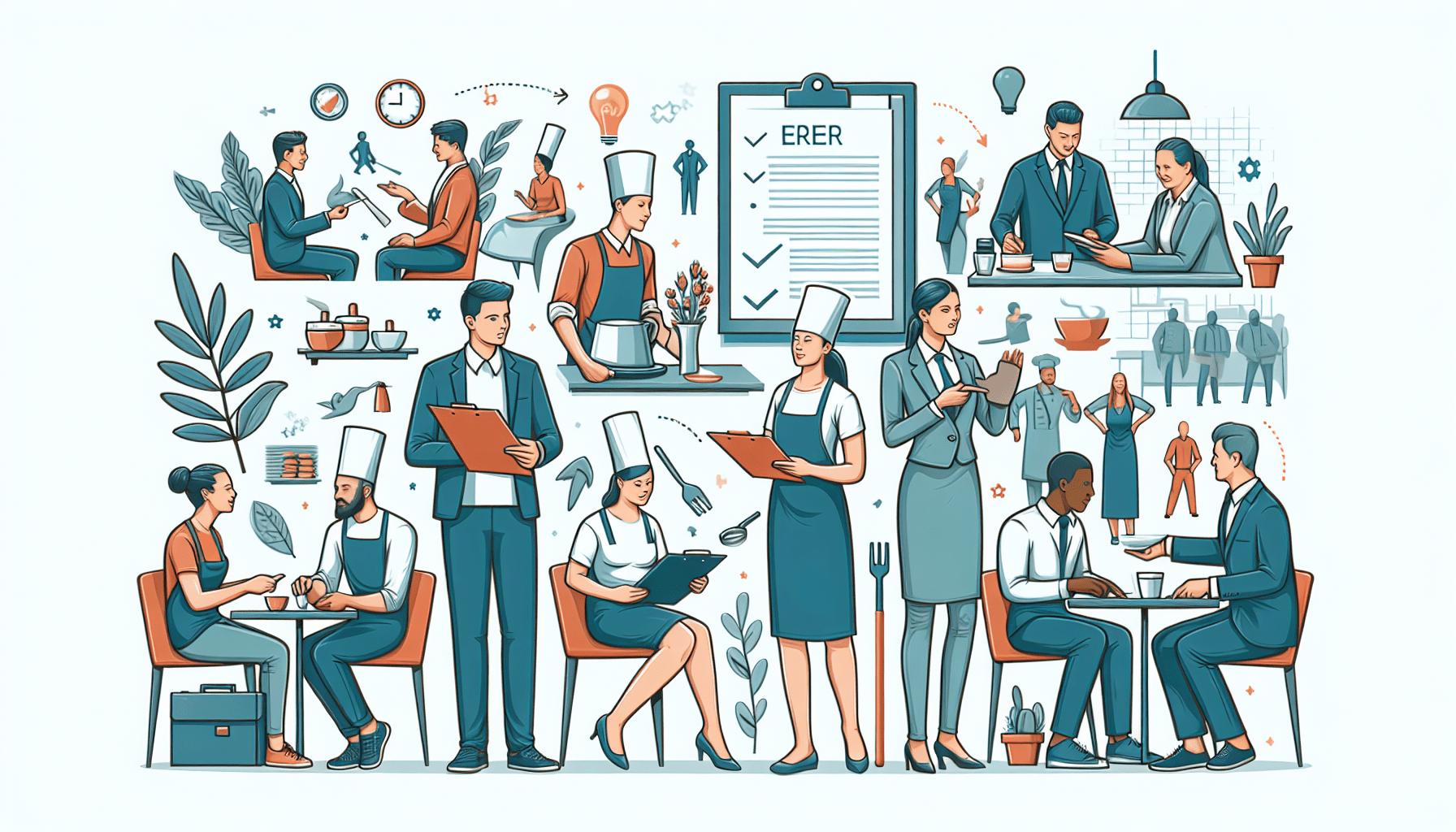Are you looking to start a successful restaurant operation and wondering how to hire and train staff effectively? Building a strong team is crucial for the smooth running of any restaurant, and this article will guide you through the process. From attracting the right candidates to providing comprehensive training, we will explore the key steps to ensure your staff is equipped with the skills and motivation needed to deliver exceptional service and contribute to the success of your establishment. So, let’s dive in and discover the secrets to building a winning team for your restaurant.
Define the roles and responsibilities
Determine the specific roles needed
When it comes to hiring staff for your restaurant operation, it’s important to determine the specific roles you’ll need to fill. Start by assessing the needs of your restaurant and identifying the various positions that are essential for its smooth functioning. These roles may include servers, bartenders, hosts/hostesses, chefs, line cooks, dishwashers, and managers, among others. By having a clear understanding of the roles you need, you’ll be able to hire individuals with the right skills and experience to excel in those positions.
Write job descriptions for each role
Once you’ve determined the specific roles needed in your restaurant, it’s time to write detailed job descriptions for each position. Job descriptions should clearly outline the responsibilities, qualifications, and experience required for the job. Include specific tasks that the employee will be responsible for, such as taking customer orders, preparing food, handling cash transactions, or supervising staff. This will help applicants understand the expectations and requirements of the job, and will also serve as a guide for you when evaluating candidates during the hiring process.
Clearly outline the responsibilities for each position
In addition to job descriptions, it’s crucial to clearly outline the responsibilities for each position in your restaurant. This includes not only the daily tasks and duties involved, but also any specific goals or targets that the employee should strive to achieve. By clearly communicating the responsibilities of each position, you can ensure that your staff understands what is expected of them and can perform their duties effectively. This will also help create a sense of accountability and ensure that everyone is aware of their role in contributing to the overall success of the restaurant.
Create an attractive job advertisement
Highlight the unique aspects of the restaurant
When creating a job advertisement for your restaurant, it’s important to highlight the unique aspects that make your establishment stand out. Whether it’s the cuisine you offer, the ambiance of the restaurant, or any special features or events, showcasing what sets your restaurant apart can attract potential candidates who align with your vision and values. By emphasizing the unique aspects of your restaurant, you can attract applicants who are passionate about the industry and eager to contribute to the success of your establishment.
Clearly state the qualifications and experience required
In your job advertisement, clearly state the qualifications and experience required for each position. This will help you attract candidates who possess the necessary skills and background to excel in the role. Be specific about any certifications or licenses that are mandatory, such as food safety certifications or bartending licenses. By clearly stating the qualifications and experience required, you can filter out applicants who do not meet the minimum requirements and focus on those who are most likely to succeed in the position.
Include information about the benefits and perks offered
To make your job advertisement more attractive to potential candidates, include information about the benefits and perks offered by your restaurant. This could include health insurance, retirement plans, paid time off, employee discounts, or opportunities for professional development and growth. By highlighting the benefits and perks, you can show potential candidates that you value and invest in your employees, making your restaurant an appealing place to work.

Implement a thorough screening process
Review resumes and applications
Once you have received resumes and applications from interested candidates, it’s important to thoroughly review each one. Look for relevant experience, skills, and qualifications that match the requirements outlined in the job descriptions. Pay attention to details such as education, work history, and any additional certifications or training that may be relevant to the position. This initial screening will help you shortlist candidates who possess the necessary qualifications and experience for further consideration.
Conduct initial phone interviews
After narrowing down the pool of candidates, conduct initial phone interviews to further assess their suitability for the position. During these interviews, ask questions related to their experience, availability, and motivation for applying to your restaurant. This is an opportunity to gauge their communication skills, professionalism, and interest in the position. Be sure to take notes and evaluate each candidate based on their responses during the phone interview.
Schedule in-person interviews
For candidates who have successfully passed the phone interview, schedule in-person interviews to assess their compatibility with your restaurant’s work environment. Prepare a list of standardized interview questions that cover various aspects of the job, including their previous experience, problem-solving skills, and ability to handle difficult situations. This will help you gather valuable insights and make informed decisions during the hiring process.
Administer skills assessments or tests
Depending on the specific positions you’re hiring for, consider administering skills assessments or tests to evaluate the candidates’ abilities in areas such as food preparation, customer service, or cash handling. These assessments can help you determine the candidates’ practical skills and their level of proficiency in the required tasks. Keep in mind that the assessments should be relevant to the job requirements and provide a fair and unbiased evaluation of the candidates’ abilities.
Check references and conduct background checks
Before making a final decision, it’s crucial to check the references provided by the candidates and conduct background checks, especially for positions that involve handling cash or interacting with customers. Contact previous employers, supervisors, or colleagues to verify the information provided by the candidates and gain insights into their work ethic, reliability, and performance. Additionally, perform background checks to ensure the candidates have a clean record and are suitable for the position in question.
Conduct structured interviews
Prepare a list of standardized interview questions
When conducting in-person interviews, it’s important to have a structured approach to ensure fairness and consistency. Prepare a list of standardized interview questions that cover various aspects of the job and assess the candidates’ suitability. These questions should be designed to evaluate their skills, experience, and ability to handle different scenarios. By asking the same questions to each candidate, you can make objective comparisons and identify the one who best fits the requirements of the position.
Allow candidates to showcase their skills and experience
During the interviews, provide candidates with opportunities to showcase their skills and experience. This could involve asking them to explain how they would handle specific situations or to provide examples of their past achievements or problem-solving abilities. By giving candidates the chance to demonstrate their abilities, you can better assess their potential to excel in the position and make a positive impact on your restaurant.
Assess cultural fit and communication skills
In addition to evaluating the candidates’ skills and experience, it’s important to assess their cultural fit within your restaurant and their communication skills. Assessing cultural fit involves gauging whether the candidate’s values, work style, and attitude align with your restaurant’s culture and core values. Additionally, evaluating communication skills will help determine whether the candidate can effectively interact with customers and work collaboratively with colleagues.
Involve key members of the management team in the interviews
To ensure a comprehensive evaluation of candidates, involve key members of the management team in the interview process. This can provide different perspectives and insights that can help in making a well-rounded and informed decision. Involving the management team also helps in assessing the candidates’ compatibility with various levels of the hierarchy and ensures that all aspects of the job requirements are covered during the interview process.

Provide comprehensive training programs
Develop an onboarding program for new hires
Once you have successfully hired new staff members, it’s important to provide them with a comprehensive onboarding program. This program should introduce them to the restaurant’s policies, procedures, and work expectations. It should also familiarize them with the layout of the restaurant and any equipment or technology they will be using. The onboarding program should be designed to help new hires feel welcomed and confident in their role from the start.
Cover all the essential restaurant operations and procedures
During the training program, be sure to cover all the essential restaurant operations and procedures that new staff members will need to know. This includes training them on how to use the point-of-sale system, handling cash transactions, and following proper food handling and safety protocols. It’s important to ensure that staff members are equipped with the knowledge and skills necessary to perform their tasks efficiently and safely.
Include training on customer service and handling difficult situations
Customer service is a crucial aspect of running a successful restaurant operation. Therefore, it’s essential to include training on customer service and teaching staff members how to handle difficult situations. This may involve providing guidance on how to handle customer complaints, addressing challenging or demanding customers, and ensuring a positive dining experience for every guest. By providing comprehensive training in customer service, you can ensure that your staff has the skills and confidence to deliver exceptional experiences to your customers.
Train staff on food safety and sanitation practices
Food safety and sanitation practices are of utmost importance in the restaurant industry. Ensure that your training program includes thorough instruction on food safety and sanitation practices. This includes proper handwashing techniques, safe food storage, and cooking temperatures. By training your staff on these practices, you can ensure that food is prepared and served in a safe and hygienic manner, reducing the risk of foodborne illnesses and maintaining a high standard of cleanliness.
Offer ongoing training and development opportunities
Training should not end after the initial onboarding process. To promote continuous growth and improvement among your staff, offer ongoing training and development opportunities. This can be in the form of workshops, seminars, or online courses that focus on enhancing specific skills or knowledge. Providing opportunities for your staff to learn and develop professionally not only benefits them individually but also contributes to the overall success of your restaurant.
Foster a positive and inclusive work environment
Promote teamwork and collaboration
Creating a positive and inclusive work environment starts with promoting teamwork and collaboration among your staff members. Encourage employees to work together, support one another, and share their knowledge and expertise. Foster a sense of camaraderie by organizing team-building activities or events that allow staff members to bond and develop strong working relationships. By promoting teamwork, you can create a harmonious and productive work environment.
Encourage open communication and feedback
Open communication is vital in any work environment. Encourage your staff to communicate openly and honestly with one another and with management. Implement regular staff meetings or check-ins to provide a forum for open discussions and feedback. Actively listen to the concerns and ideas of your staff, and address any issues in a timely and effective manner. By fostering open communication, you can create a culture of trust and transparency, ultimately leading to a more positive work environment.
Recognize and reward employee achievements
Recognizing and rewarding employee achievements is essential for boosting morale and motivating your staff. Acknowledge and appreciate their hard work, whether it’s through verbal recognition, a handwritten note, or a small token of appreciation. Consider implementing an employee recognition program that highlights outstanding performance and rewards exceptional contributions. By recognizing and rewarding employee achievements, you not only make your staff feel valued but also encourage a culture of excellence and dedication.
Provide opportunities for professional growth and advancement
To keep your staff motivated and engaged, provide opportunities for professional growth and advancement. Offer training programs and workshops that enable employees to enhance their skills and knowledge. Support staff members who express a desire for career advancement by providing mentorship or coaching. By investing in the professional development of your staff, you can foster loyalty and ensure the long-term success of your restaurant.
Create a diverse and inclusive workplace
A diverse and inclusive workplace is not only ethically important but also contributes to the success of your restaurant operation. Foster an environment that celebrates diversity and actively promotes inclusivity. Ensure equal opportunities for all staff members, regardless of their race, gender, age, or background. Encourage a culture of respect and appreciation for different perspectives and experiences. By creating a diverse and inclusive workplace, you can attract and retain a more diverse customer base, strengthen employee morale, and foster creativity and innovation.

Emphasize the importance of customer service
Train staff on delivering excellent customer service
Customer service is the backbone of a successful restaurant operation. Train your staff on delivering excellent customer service by emphasizing the importance of attentiveness, friendliness, and professionalism. Teach them to greet guests with a smile, actively listen to their needs, and provide prompt and efficient service. By prioritizing customer service in your training programs, you can ensure that every interaction with a customer is positive and memorable.
Teach effective communication and problem-solving skills
Effective communication and problem-solving skills are essential for providing excellent customer service. Train your staff on how to effectively communicate with customers, both verbally and non-verbally. Teach them active listening skills and how to empathize with customers to better understand their needs. Additionally, provide them with problem-solving techniques that enable them to resolve any issues that may arise during a customer’s visit. By equipping your staff with these skills, you can ensure that they can effectively handle any situation and provide exceptional service.
Empower employees to handle customer complaints and resolve issues
Empowering your employees to handle customer complaints and resolve issues on their own is crucial for maintaining customer satisfaction. Provide them with the authority and resources necessary to address customer concerns promptly and effectively. Encourage them to take ownership of the situation and work towards finding a satisfactory resolution. By empowering your staff to handle customer complaints, you can instill confidence in your customers that their concerns will be addressed and their satisfaction prioritized.
Encourage staff to go above and beyond to exceed customer expectations
Encourage your staff to go above and beyond in exceeding customer expectations. Train them to anticipate the needs of customers and provide personalized experiences whenever possible. Encourage creativity and initiative in finding ways to enhance the customer’s dining experience. By fostering a culture of exceeding expectations, you can create loyal customers who not only return but also recommend your restaurant to others.
Implement a mentorship or buddy system
Pair new hires with experienced employees
Implementing a mentorship or buddy system can greatly benefit new hires and help them acclimate to their role more quickly. Pair each new hire with an experienced employee who can guide and support them during their initial period on the job. The experienced employee can provide guidance, answer questions, and give insights into the culture and expectations of the restaurant. This support system can help new employees feel more comfortable and confident in their role, leading to faster integration and productivity.
Facilitate knowledge sharing and skills development
The mentorship or buddy system not only benefits new hires but also facilitates knowledge sharing and skills development among employees. Encourage mentors and buddies to actively share their knowledge and expertise with their assigned new hires. This can include sharing tips and tricks, demonstrating best practices, and providing guidance on how to excel in their role. By facilitating knowledge sharing and skills development, you create a learning culture within your restaurant and promote continuous improvement.
Provide a support system for new employees
Starting a new job can be overwhelming, especially in a fast-paced environment like a restaurant. By implementing a mentorship or buddy system, you provide a support system for new employees. They have someone they can turn to for guidance, support, and encouragement. This support system can help alleviate stress and build confidence in their abilities, ultimately leading to higher job satisfaction and retention.
Promote a sense of camaraderie and teamwork
A mentorship or buddy system can also promote a sense of camaraderie and teamwork among your staff members. By pairing colleagues together, you encourage them to build relationships and work collaboratively. When employees feel supported by their peers, they are more likely to have a positive attitude towards their work and contribute to a harmonious and productive work environment.

Continuously evaluate and provide feedback
Conduct regular performance evaluations
To ensure that your staff members are meeting the expectations and standards of your restaurant, it’s important to conduct regular performance evaluations. Schedule formal evaluations at least once or twice a year to assess each employee’s performance, strengths, and areas for improvement. Use these evaluations as an opportunity to provide feedback, set goals, and offer guidance on how they can continue to grow and develop within their role.
Provide constructive feedback for improvement
In addition to formal performance evaluations, it’s important to provide regular and ongoing feedback to your staff members. This feedback should be constructive and focus on areas where improvement is needed. Offer specific examples and actionable suggestions to help employees understand how they can enhance their performance. By providing constructive feedback, you can guide your staff towards continuous improvement and strengthen their skills and abilities.
Recognize and reward exceptional performance
Recognizing and rewarding exceptional performance is just as important as providing constructive feedback. When employees go above and beyond, acknowledge their efforts and express your appreciation. Recognize their achievements publicly, whether it’s during staff meetings, through an employee newsletter, or by implementing an employee of the month program. By celebrating exceptional performance, you motivate your staff and create a positive work environment where excellence is valued.
Address issues or concerns promptly
When issues or concerns arise, it’s important to address them promptly and effectively. Actively listen to your staff’s concerns, validate their feelings, and work together to find solutions. Create an open-door policy that encourages employees to approach you with any issues they may be facing. By addressing issues or concerns promptly, you demonstrate your commitment to creating a supportive and respectful work environment.
Stay up-to-date with industry trends and best practices
Attend conferences, workshops, and industry events
To stay ahead in the restaurant industry, it’s essential to stay up-to-date with the latest trends and best practices. Attend conferences, workshops, and industry events that provide insights and knowledge on emerging trends, technologies, and strategies. Engage with industry experts and network with other professionals to gain valuable insights and perspectives. By actively participating in these events, you can ensure that your training programs and practices remain relevant and aligned with industry standards.
Encourage staff to pursue professional development opportunities
Professional development is not only important for your own growth as a restaurant owner or manager but also for your staff members. Encourage your staff to pursue professional development opportunities such as industry certifications, online courses, or workshops that enhance their skills and knowledge. Provide support and resources to facilitate their growth and development. By investing in the professional development of your staff, you can foster a culture of continuous learning and improvement.
Stay informed about new technologies and advancements
The restaurant industry is continuously evolving, with new technologies and advancements being introduced regularly. Stay informed about these developments and assess their potential benefits for your restaurant operation. Whether it’s implementing online ordering systems, utilizing inventory management software, or leveraging social media for marketing, staying up-to-date with new technologies can help streamline operations and improve efficiency.
Adapt and evolve the training programs accordingly
Based on industry trends and best practices, regularly evaluate and adapt your training programs accordingly. Identify areas where improvements can be made and implement changes to enhance the effectiveness of your training. Stay flexible and open to new approaches and methodologies that may improve staff performance and productivity. By continuously evolving your training programs, you can ensure that your staff remains well-equipped to meet the demands of an ever-changing industry.
In conclusion, hiring and training staff for a successful restaurant operation requires careful planning, clear communication, and ongoing evaluation. By defining the roles and responsibilities, creating attractive job advertisements, implementing a thorough screening process, conducting structured interviews, providing comprehensive training programs, fostering a positive work environment, emphasizing customer service, implementing a mentorship or buddy system, continuously evaluating and providing feedback, and staying up-to-date with industry trends and best practices, you can build a skilled and dedicated team that will contribute to the success and growth of your restaurant operation.

